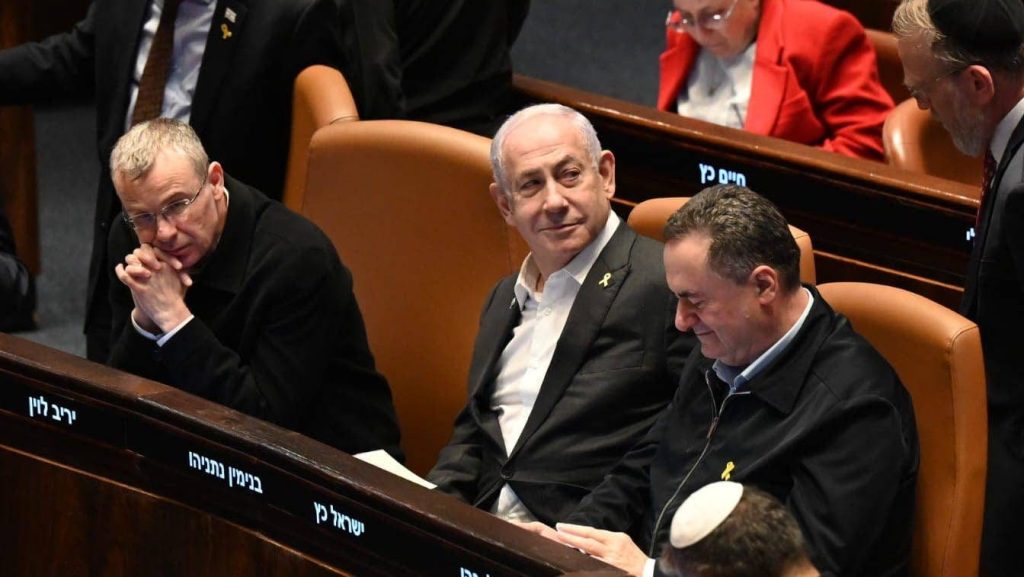Israeli Prime Minister Benjamin Netanyahu’s recent prostate surgery has added a layer of complexity to the already tense political landscape in Israel, coinciding with crucial budget votes and escalating coalition disputes. Despite medical advice to rest following the procedure, Netanyahu, accompanied by his physician, made a brief appearance in parliament for a critical vote on the “Trapped Profits Law.” This legislation, aimed at taxing corporate retained earnings previously exempt to encourage investment, has become a point of contention within the governing coalition, potentially jeopardizing the timely passage of the state budget. The convergence of Netanyahu’s health concerns, the contentious budget debate, and escalating regional tensions underscores the delicate balance the Israeli government must maintain.
The “Trapped Profits Law” has become a bargaining chip for two key coalition partners, the United Torah Judaism (UTJ) and Otzma Yehudit parties. The UTJ is leveraging its support for the bill to pressure the government on legislation exempting ultra-Orthodox Jewish citizens from military service, a long-standing and divisive issue in Israeli society. Concurrently, Otzma Yehudit, led by National Security Minister Itamar Ben-Gvir, demands increased funding for law enforcement and emergency services as a condition for their support. These demands place Netanyahu in a precarious position, requiring him to navigate competing interests within his fragile coalition while simultaneously addressing his own health recovery. Failure to secure passage of the budget by the March 31 deadline would trigger automatic elections, further destabilizing the political landscape.
Netanyahu’s health has been a recurring concern in recent years, with the recent prostate surgery following a series of medical procedures, including hernia surgery, treatment for dehydration, and the implantation of a pacemaker. Despite these health challenges, the 75-year-old prime minister continues to navigate a demanding schedule, including ongoing testimony in a corruption case against him. These personal challenges are compounded by the escalating security concerns in the region, requiring Netanyahu to oversee military operations targeting Iranian-backed groups while managing domestic political pressures.
Beyond the immediate political and health challenges, the broader implications of the “Trapped Profits Law” and the coalition disputes reflect deeper societal tensions. The debate over ultra-Orthodox exemption from military service touches upon fundamental questions of civic duty and equality within Israeli society. The demands for increased security funding underscore the ongoing security concerns and the delicate balance between resource allocation and social welfare programs. These issues highlight the complex interplay of political, economic, and social factors that shape the Israeli political landscape.
The confluence of Netanyahu’s health, the budget vote, and the coalition demands creates a complex and volatile political situation. The prime minister’s ability to navigate these challenges will significantly impact the stability of his government and the direction of Israeli policy. The outcome of the budget vote and the resolution of the coalition demands will have significant implications for the future of the Israeli government and the country’s political stability. Netanyahu’s leadership will be tested as he seeks to balance the competing interests within his coalition while addressing the pressing security concerns and his own health recovery.
The current political climate in Israel underscores the fragility of coalition governments and the challenges of governing in a complex and dynamic environment. The interplay of political maneuvering, economic policy, and security concerns creates a precarious balance that requires skillful leadership and strategic decision-making. The coming weeks will be crucial for Netanyahu and his government as they navigate these multifaceted challenges and strive to maintain stability in a region rife with tensions. The decisions made during this period will have far-reaching consequences for the future of Israel and its relationship with the broader international community.


